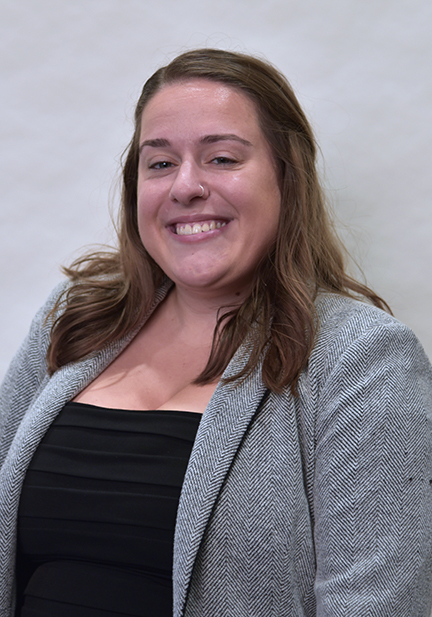 Some students arrive at law school already aware of the direction they would like to go with their law career. Catholic Law is committed to supporting those students’ passions and fostering their focus. Through certificate programs and concentrations, students can pursue an enhanced level of expertise in some of the most dynamic areas of law which. Third-year evening student Mary (Umstead) Finke has had a long-held interest in mental health and the law and hopes to utilize her concentration in Criminal Litigation to help others. “I have always been interested in the intersection of mental health and the criminal justice system and knew I wanted to work with individuals who are incarcerated, especially with severe mental health issues, for quite some time.” Recently, Finke took a moment to reflect on her law school experience and her plans for a career in law.
Some students arrive at law school already aware of the direction they would like to go with their law career. Catholic Law is committed to supporting those students’ passions and fostering their focus. Through certificate programs and concentrations, students can pursue an enhanced level of expertise in some of the most dynamic areas of law which. Third-year evening student Mary (Umstead) Finke has had a long-held interest in mental health and the law and hopes to utilize her concentration in Criminal Litigation to help others. “I have always been interested in the intersection of mental health and the criminal justice system and knew I wanted to work with individuals who are incarcerated, especially with severe mental health issues, for quite some time.” Recently, Finke took a moment to reflect on her law school experience and her plans for a career in law.
Finke grew up in the small town of Clifton Forge, Virginia—near the West Virginia border. She attended Davis and Elkins College on an academic and athletic scholarship for cross country and track. In the fall of 2016, following graduation from D&E, Finke moved to the North Virginia area to pursue a master’s at Marymount University. This ultimately led to her interest in attending law school. “I got my master’s in Forensic and Legal Psychology a year after I graduated from undergrad, and also interned in the Juvenile and Domestic Relations Court. It was from there I decided I wanted to be in the courtroom.” So, Finke got a job as a paralegal where she worked for a year before applying to law school.
Finke felt Catholic Law was the right fit for her for a number of reasons. Not only did it provide opportunities for specialized, focused study in concentration areas, but it also has a thriving Part-Time Evening Division designed to meet the needs of working professionals seeking to earn their J.D. (while studying in the evening division, Finke is also able to work full-time as a law clerk at a firm in Maryland that focuses on civil and criminal litigation). But perhaps the most important reason Finke felt drawn to Catholic Law was the feeling of support from the Law School community. “Catholic Law does not have the competitive feel as most law schools, we all want to help each other succeed and be successful. Law school is hard enough without cutting down your peers, and I am so happy I chose a law school where those feelings are not intertwined with our learning and a place where I can go to a classmate for help or notes from missing a class.”
In the interest of increasing access to justice, Finke has prioritized providing pro bono legal services to people who otherwise would not be able to access or afford legal assistance and to organizations working to improve access to justice. “I am heavily involved in pro bono opportunities, such as VITA, The People’s Law Library of Maryland, the Workers’ Right Clinic, and Christian Legal Aid of DC. I have loved all of these opportunities and getting to make a real difference in these individuals' lives has been one of my favorite parts of law school so far.”
Despite an already full schedule of classes, work, and pro bono work, Finke still finds time to actively participate in co-curricular activities on campus. Since her first year of law school, Finke has been a member of the Evening Law Students Association (ELSA), and this year, she has stepped into the role of President for the organization. “ELSA has been the highlight of my CUA Law career so far, and I am proud to advocate on behalf of my fellow classmates to make the evening experience as good as possible.”
While Finke acknowledges that her life is busy right now—and will continue to be until her graduation in May of 2023—she knows that all the hard work will be worth it. For now, she sets boundaries and expectations with friends and family to help her maintain a sense of balance. “It was really important for me to let all my friends and family know this will be a hard four years, and I may not be around as much as I would like. Fear of missing out is still a very real thing for me, but I just had to get confident with saying no to plans I knew I could not make.” She concluded, “I try not to spread myself too thin, and really just focus on work and school—knowing that in a few years I will be out on the other side, with (hopefully) some time to do all the things I want to do.”
